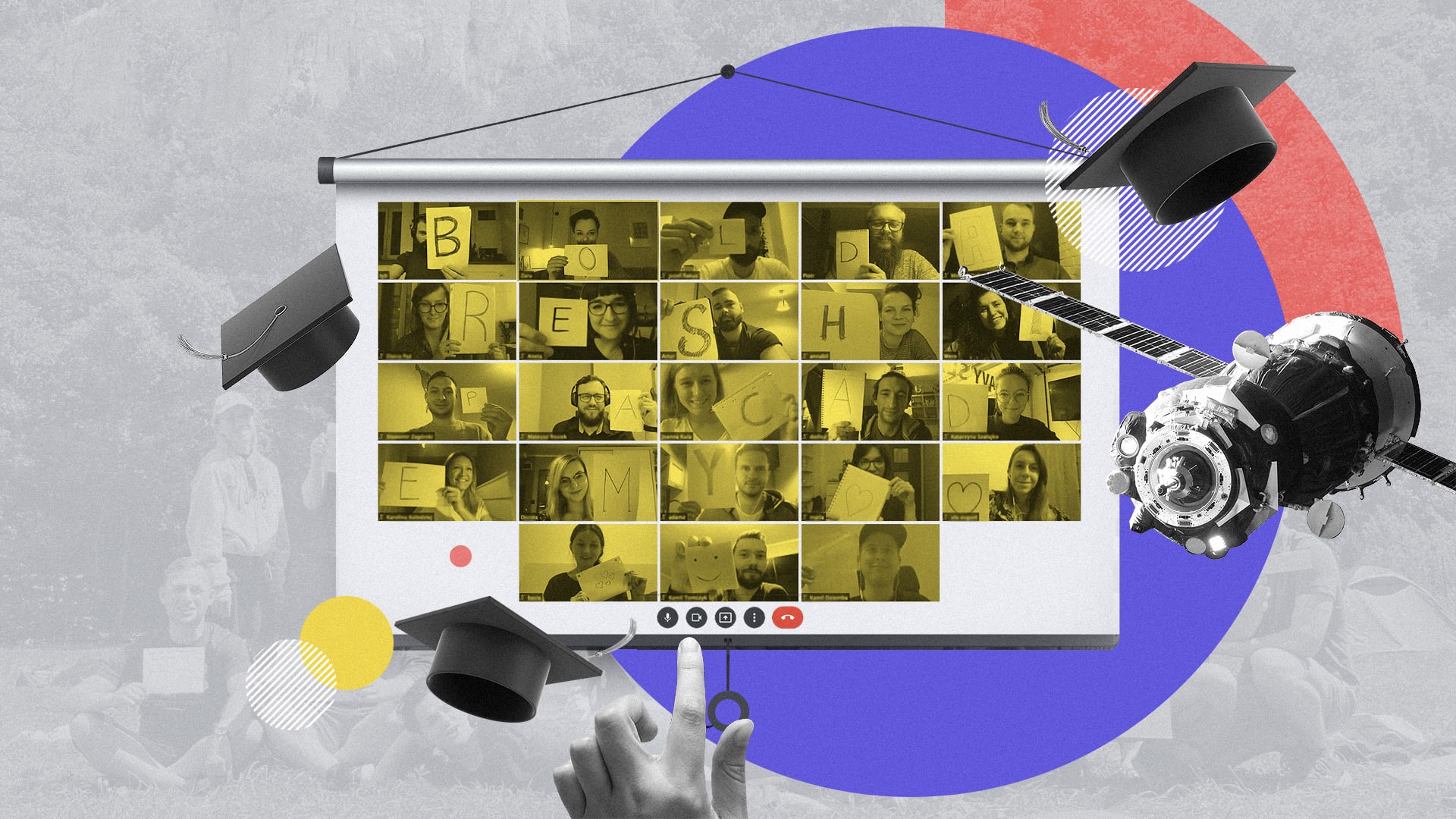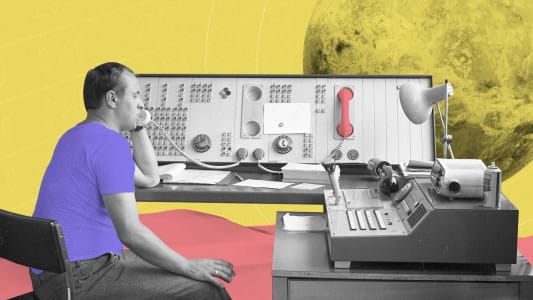Boldareship Academy: how we built our own league of leaders
What distinguishes Boldare from other product development companies is a modern approach to management and the promotion of a culture of self-organisation. And these are not just empty words! Four years ago, we introduced holacracy, a management system that has allowed us to maintain a flat structure and a fast pace, despite significant growth of the organisation (and, since implementing holacracy, we have practically doubled the number of employees).

Table of contents
It’s a solution that allows employees to make their own decisions within their roles, without the necessity to get an approval from their supervisor. It accelerates innovation implementation and supports learning through experience: it allows you to learn from both successes and failures, which can always be a lesson and a source of valuable conclusions.
What attitudes does such an organisation require, how does it create and nurture them? In the case of Boldare, the answer is the Boldareship Academy - an internal leadership academy co-created by Piotr Majchrzak, Co-Founder of Boldare. To find out what the aim of the academy is and why its form is so unique, read the interview with Piotr.
Magdalena Plasun: To begin with, let’s provide a little context. Boldare is an organisation with a very unusual management model and structure, because it operates in a holacratic system. What does it actually mean?
Piotr Majchrzak: In terms of the purpose of management, Boldare is no different from other companies. We are looking for a way to organize work that will allow the employees to be as efficient as possible. What really makes us different is the way we achieve this, which is related to how we see the world.
The world has changed dramatically over the last few decades (and the changes are still happening at a fast rate). As a result, the Taylorist paradigm that sees a company as a machine made up of cogs no longer holds true. In 2021, companies need creativity, rapid response to market changes and constant evolution. A machine is designed to do one thing in the same manner, while today we need constant change at all levels of a company’s operations. The change cycle has gone from several years to several months.
I think it is extremely important for people responsible for other people’s work to design solutions which support the whole organisation, not just its HR-related part. Otherwise, sooner or later, their actions are likely to become dissonant.
This is particularly important to me also for the reason that the company is the unit of society which most affects our environment (after the family). It should therefore function well in all its aspects. How people fare at work affects not only the quality of their lives, but also that of their families, friends, or even neighbours.
We work in holacracy because this management system gives people freedom to act. It allows them to independently create roles, while preventing chaos and structuring their work. It promotes decisions based on merit and supports innovation because improvements are made by all employees, not just managers. Besides, treating employees like adults who can make responsible decisions on their own is simply important for them to get the job done. This affects the quality of what they do, and how they meet deadlines, not to mention job satisfaction.
Magdalena: Is there still room for leadership in an organisation without managers?
Piotr: Yes, lots of it! Leadership becomes a topic for everyone, not just a handful of managers. More levels of leadership emerge. If people are to make decisions on their own, you need to ensure visibility of data for all of them, create other budgeting mechanisms, or teach them to give feedback directly.
Magdalena: Last year, together with Anna Zarudzka (the other co-founder of Boldare), you launched the Boldareship Academy - a special programme to help your employees develop leadership skills. What is the vision behind it?
Piotr: The secret to our success on the global market is innovation, which often involves breaking the mould. Unfortunately, today the education system still teaches how to replicate rather than create solutions.
We have noticed there is a lack of knowledge on the market about a modern approach to the concept of a company, which is required, for example, by holacracy. That is why we decided to set up the Boldareship Academy. It is a programme that gives leaders the tools to build environments that are conducive to creating things that do not yet exist in both our company and our clients’ companies. We give everyone the chance to become an “intrapreneur”, a small CEO in their job.
Magdalena: What does the academy consist in? Can you tell us a bit more about its format?
Piotr: There are five sessions that last between two and three days and take place every other month. Each of these sessions has a theme:
- “I see, I notice” - about what it means to be attentive;
- “I notice and I take” - what ownership and followship are;
- “I Act” - self-organisation vs loneliness;
- “I Act” - entrepreneurship and iteration;
- “I influence” - influence and education.
Each module is designed so that, having learnt a bit of theory, we move straight to practice and applying it to real-life examples. This ensures that groups not only learn by doing, but develop solutions that are needed by the company. The decision whether a developed solution is good or bad depends on whether a particular action has been beneficial or not.
In addition, we devote a lot of space to reflection and ways of dealing with problems that are rarely discussed in companies. How do you deal with burnout or failure? How do you work as a group, not as an individual?

Magdalena: Why are the sessions cyclical rather than on a continuous basis?
Piotr: The cyclical nature of the sessions provides the opportunity to work continuously on change. And because the topic is not trivial, each of us, including our whole company, needs time to improve at it.
Owing to this cyclical nature, the participants can apply the methods they have learned in practice, between the sessions. This practical application, and the things done between the modules, have a great educational value for the whole academy. I believe that this approach is much better at supporting change and creating a “deeper” effect. After all, we don’t leave the participants with theory only but allow them to put it into practice. Through the learning-practice-improvement loop, we give support throughout the whole cycle.
Magdalena: Do the Bolders only acquire knowledge in the workshops, or also between them? If so, how?
Piotr: The academy participants work in teams between modules as well. The purpose of these teams is to solve a problem they have already noticed before the academy. In addition, many elements of the academy are used in everyday work (so people improve their skills).
To sum up: yes, we learn throughout the duration of the academy, not just in the workshops.
Magdalena: When did the idea for the academy emerge? Where did you get the inspiration for this form?
Piotr: We were greatly inspired by a course on new forms of management which lasted a little over a year. Together with other European executives, we not only learned how to manage, but discovered innovative ways that have existed in many companies for years.
Magdalena: What need does this format meet? Why did you decide to invest in it?
Piotr: We wanted to accelerate independent change implementation by each employee at Boldare. We deal well with changes in the area of individual teams with high autonomy. However, increasing the number of changes on a cross-team and company-wide level is where we see great potential for further development.
We’ve invested in leadership development because we believe that this will unlock the potential of dormant ideas, as a result of which the company will become more innovative.
Magdalena: Do only leaders take part in the academy?
Piotr: We believe that anyone who has a vision that something can be done better and makes a change that brings reality closer to that vision is a leader. Various people meet at Boldareship Academy: developers, designers, scrum masters, area leaders, people responsible for sales or customer success.
Magdalena: What were the goals you set when designing the academy?
Piotr: When we innovate, it’s often difficult to predict the outcome. That’s why, in such cases, we make a hypothesis which we then validate by implementing the idea. Here, our hypothesis is an assumption that the academy will accelerate the number of changes in Boldare. Based on this approach, we completed the first module, after which we tested whether the assumption had been correct.
Since the value outweighed the cost, we continued. If it hadn’t, we would probably have introduced some modifications. If this, too, hadn’t worked, we would have called off the programme and shared the “lessons learnt” with the whole company.
Magdalena: What can you learn at the academy?
Piotr: At the academy you can learn things that are useful in everyday work (team facilitation, goal setting, group dynamics, decision-making processes in distributed groups) as well as how to create a vision, strategy or tactics. A lot of space is also devoted to personal development and the ability to cope with stress. In addition, you can learn how to creatively use what is around you (for example: how to make a video in 30 minutes on solving a particular problem). These creative elements are what surprises us most.
Magdalena: Was it a big challenge to run the academy during the pandemic? How did you deal with it?
Piotr: Creating something new and risky is always a challenge. Our solution to this is what we call “start by starting.” With a minimal vision for the academy, we simply started it and then it took off. :-)
Magdalena: I know that soon after the start of the first edition of Boldareship Academy another group began the programme. Why did you make this decision?
Piotr: It turned out we had a lot of further “clients,” so it was an easy decision. :-)
Magdalena: Do the programmes for the two groups differ in any way?
Piotr: No. The academy is based on the premise that each group follows the same programme.
Magdalena: Can you already see a return on your investment in the academy? What benefits has it already brought and what benefits do you expect in the future?
Piotr: Yes, of course. The quarter following the launch of the academy saw the greatest number of changes in our company since its establishment. What’s more, we can see there is a better understanding of what the organisation is about, why we do certain things the way we do them. Finally, we have noticed improved cooperation between people who don’t work together on a daily basis. We expect the academy will inspire even more drive in the organisation because of the effect of scale.
Magdalena: Last but not least, who would you recommend this format to, and why?
Piotr: I recommend it to people who are curious about the world and want to change it for the better, starting with their immediate environment.
Share this article:










